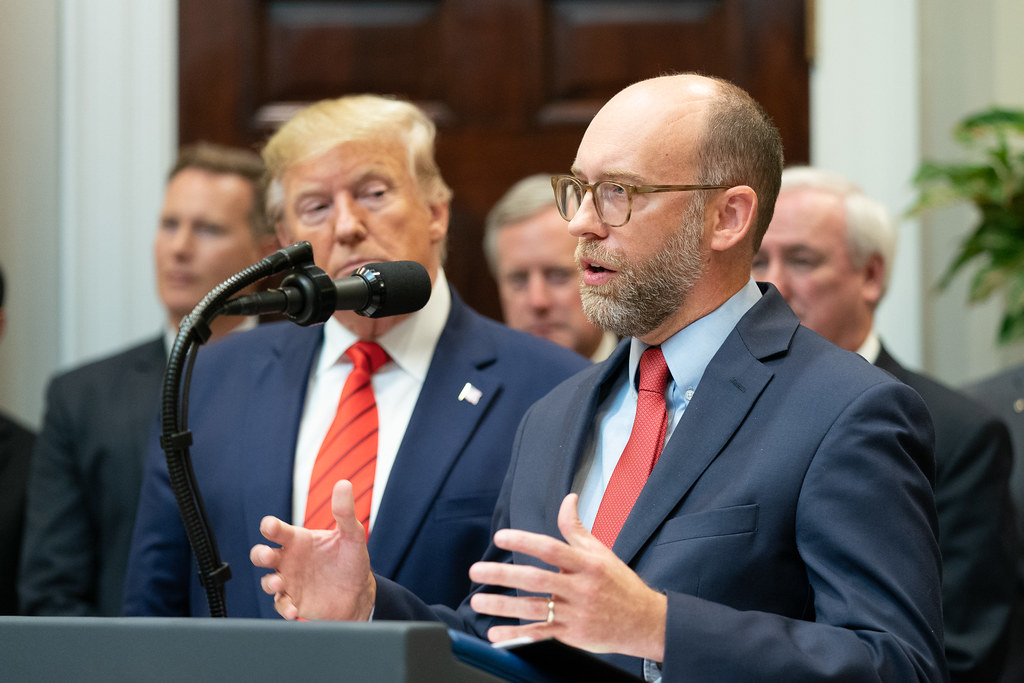At the core of the Revolving Door Project’s work is a deeply held belief that government should work to advance the public interest, not the goals of a wealthy and well-connected few. For too long, this has been far from the reality. By quietly capturing key positions throughout the executive branch, corporate America has reshaped the rules that govern our economy. RDP regularly calls attention to these oft-overlooked corporate allies to increase the political costs of politicians’ consequential personnel concessions. At the same time, we are leading the way in envisioning an alternative model — one in which political appointments go to a more representative, public-interest minded class of leaders — and charting how we get there.
As important as this work is, however, it alone will not be sufficient to remake government for the people. Even the most committed, effective leaders can do very little to advance the public interest if the institutions they lead are broken. And our governing infrastructure is crumbling. After years of attacks from both sides of the aisle, the federal government is able to do less overall and to do what it still does less effectively. This is not, as some would have you believe, an inherent failure endemic to “Big Government” but the opposite — ineffectiveness is the direct result of disinvestment.
Civil service capacity*, in particular, has suffered. The corps of people who make the government run each day is shrinking when compared to the country’s population. It is also aging as it struggles to attract new talent, especially under austerity regimes such as the Obama-Boehner “sequester deal” in which new hiring was often off the table. The federal government today employs about as many workers as it did in 1960, which some conservatives see as a sign of their failure not to gut it more. Meanwhile, civil servants are regularly denigrated as lazy, ineffective, and greedy. And, of course, these problems only grew more acute throughout Donald Trump’s destructive four years in office.
If we want the government to work for the people again, we can no longer neglect the question of who is doing that work. The Revolving Door Project is working to draw attention to this overlooked aspect of governance and to ensure that our leaders have the political will to take it on. That work can be divided into two overarching tranches: demanding accountability for Trump’s particularly egregious attacks on the civil service and proposing a more expansive vision for full-time federal personnel policy going forward.
Coming to Terms with Trump’s Legacy
Throughout his time in office, Trump made no secret of his contempt for the civil service. In ways both big and small, Trump and his cronies made it more difficult for members of the federal workforce to do their jobs and in the process rendered us all much less safe. Career employees who contradicted him were at best ignored and at worst suffered severe retaliation. Entire offices that were seen to pose a threat were moved across the country. Meanwhile new hiring was frozen and budgets slashed, leaving those who remained with the trying task of doing more with less. In the administration’s closing days it went even further, lobbing a bomb at the civil service system in the form of Trump’s schedule F executive order.
More disturbing still is the fact that these attacks undertaken in the public eye likely only represent the tip of the iceberg. This administration could easily have been accomplishing much more behind closed doors. This includes politicizing career hiring processes (as occurred during the George W. Bush administration), expanding the use of government contracting, reorganizing offices to reduce career officials power, and more. Each of these moves will cause problems over the long-term if not uncovered and reversed. A first step, therefore, in rebuilding the civil service and government capacity will be to clearly understand what the Trump administration accomplished.
Envisioning Something New
In addition to turning our gaze backwards to the last four years, Revolving Door Project is working to chart a path forwards. Specific proposals to rebuild the civil service and increase the government’s capacity to act in the public interest will vary, but we believe that all should adhere to the following basic principles:
- We can no longer tolerate personnel shortfalls. Political leaders must commit to investing what it takes to ensure that the civil service has the capacity it needs – in terms of the raw number of people, technical resources, and expertise – to carry out its functions. That will include a short term surge to use existing authorities to replenish agencies devastated by Trump as well as serious medium and long term initiatives.
- We must elevate and valorize civil servants’ expertise. Trump’s denigration of civil service expertise has been extraordinary, but he is far from the first president to sideline career experts. The balance of power between political appointees and civil servants has shifted steadily in the former’s favor under both Democratic and Republican presidents. That means higher turnover and less experience in key decision-making roles. It is time to start shifting the balance back by making more space for civil servants to weigh in at the highest levels. Hero of the moment, Dr. Anthony Fauci, is far from the only public servant with the expertise and commitment to meaningfully advance the public interest in times of peace and of crisis alike. The next administration should look to unleash this vast store of knowledge and public-minded energy.
- Civil service jobs should be good jobs. To attract new civil service entrants, policymakers must improve the quality of civil service jobs. Many civil servants operate in a hostile environment, subject to political attacks (from both outside the walls of government and inside them) which often manifests in chronic underfunding, and thus, overwork. Our political leaders must reject this scapegoating wholesale.
In addition to funding under-resourced departments, they should commit to creating more pathways for hiring (especially for people from marginalized communities who are severely underrepresented in the civil service’s upper ranks) and to providing career officials with more meaningful control over executive-branch policymaking. That must involve recognizing unions representing civil service workers as legitimate stakeholders with whom leaders should negotiate in good faith. It should also include trimming down the growth in layers of political appointees (many of whom lack subject matter expertise) who sit between career experts and decision-making power. While political appointees are an important and necessary part of executive branch governance, excessive politicization of the type we see today is detrimental. - After years of government outsourcing, we need a new wave of insourcing. In the 1990s, the Clinton Administration “reinvented” government, putting many of its core functions into the hands of contractors. These policies particularly devastated workers of color who are disproportionately represented in the public workforce and for whom public employment has long represented an especially promising pathway to the middle class. Over two decades later, it is clear that that strategy has failed. Government contractors are neither cheaper nor, seemingly, more effective.
As for the workers, those employed by contractors tend to have lower wages and worse benefits than their public sector counterparts (the costliness of this workforce stems from the spoils going to firms’ senior management, shareholders, and lobbying/government relations teams). And, with the number of contract workers ballooning, it is becoming ever more difficult for Congress to properly oversee this “shadow” workforce. It’s past time that the federal government take back control of more of the work of government, for the sake of those who are actually doing the jobs and in the spirit of greater democratic control.
Those who wish to see the federal government work for the public interest cannot afford to ignore the plight of those who will be tasked with reaching these goals. By improving the quality of civil service jobs, policies in line with these principles will encourage new people to join the federal workforce and make it so that those who do join want to stay. That will translate, in turn, to greater expertise in policy decision-making, better continuity of operations during transitions, and a greater capacity to respond to the country’s long- and short-term challenges. In short, such policies will help to grant our federal government the capacity to effectuate structural changes.
* We define civil service personnel broadly to include both members of the civil service and career officials in “excepted” roles like those at the Department of Justice or the Treasury Department.
Below you will find some of the project’s writing and research on government capacity. For a selection of quotes and interviews on the topic, please visit this page.

July 16, 2024
Former Trump Officials Wrote 25 of the 30 Chapters in the Project 2025 Playbook
Former President Trump has recently sought to distance himself from Project 2025 and its radical proposals, claiming that he knows “nothing about” it, has “no idea who is behind it,” and has “nothing to do with them.” Project 2025 has tried to create some distance as well, maintaining in a recent tweet that it is “not affiliated with former President Trump.” It’s a classic example of drawing a distinction without a difference.
May 15, 2024 | Revolving Door Project Newsletter
Pioneer’s Price Fixing Scandal Is Yet Another Reason We Need To Fully Fund Antitrust Enforcers
Major corporate scandals make the consequences of Republican-led budget cuts at antitrust enforcement agencies even clearer. Crucially, they serve as reminders that the federal government’s ability to combat the ill effects of monopolization rises and falls in direct proportion to funding, even when motivated and creative leadership are at the helm.

May 10, 2024
Four executive branch agencies that desperately need more funding and staffing
Across the federal government, we continue to see how staffing issues are preventing agencies from fulfilling their mandate, at the expense of the public and to the benefit of corporate wrongdoers. The Food and Drug Administration (FDA), The Federal Emergency Management Agency (FEMA), The Environmental Protection Agency (EPA), and The Internal Revenue Service (IRS) are 4 agencies that desperately need more funding and staffing to protect and do right by the American people.
April 17, 2024 | Revolving Door Project Newsletter
The FAA and Flights of Financial Folly
Boeing Won’t Self Regulate; We Can’t Keep Trusting Them To

April 15, 2024
Unpacking The Federal Executive Branch, A Conversation With Vanderbilt University Professor David Lewis
Coverage of presidential elections typically hones in on contestants’ competing legislative visions, which in truth, tend to morph considerably when hit by the reality of an intransigent Congress. This prompts an important question: are presidential elections overrated? Well, before drawing that conclusion, consider one of the underrated consequences of a federal election: the potential for a new administration to alter the management of the federal workforce and the operations of individual departments within the executive branch. Although journalists eschew reporting of these consequences in favor of (legislatively focused) policy platforms and rallies, there is a wide body of academic research which investigates the impact of presidential administrations on the federal executive branch’s ability and capacity to fulfill its roles and responsibilities.
April 03, 2024 | Revolving Door Project Newsletter
Who’s Afraid of the “Deep State”?
Show me a politician rabble-rousing about “unelected bureaucrats” running the country, and I’ll show you someone who wants those bureaucrats to be serving their interests, not the country’s. Show me a company crying foul about government overreach, and I’ll show you a company trying to get away with—in some cases, literally—murder.
March 06, 2024 | Revolving Door Project Newsletter
Throwing the Public’s Defenders Under the (Mini)Bus
By Friday, Congress needs to vote on a proposed “minibus”—a package of six out of the 12 necessary government spending bills for fiscal year 2024—to avoid a partial government shutdown. We’ve got a handy explainer of all the federal budget terms you wish you didn’t need to know, from “minibus” to “poison pill” to the Fiscal Responsibility Act of 2023, which is the reason why our country’s grotesque military budget is getting a $26 billion boost up to $886 billion, while non-defense spending is getting a $4 billion cut, down to $773 billion.
While there are plenty of damning narratives to derive from the latest in government appropriations dysfunction, there is one story in particular that we’re anxious to see told by the White House and Congressional Democrats, and it’s this…

February 21, 2024 | The New Republic
A Return to Trump’s Housing Policies Would Be a Disaster
The former president made his name as an unscrupulous real estate magnate. So it’s no surprise that he pushed for ideas designed to take from the poor and give to the rich.

January 10, 2024
Blog Post Climate and EnvironmentCongressional OversightCorporate CrackdownGovernment CapacityHousingIRS
Glossary of Useful Federal Budget Terms
Learning about the federal government’s budget process can be daunting. Here are a few key terms to help better understand of the federal budget process as of late.


November 15, 2023 | RDP Newsletter
We Can’t Let Budget Negotiations Make A Punching Bag of Agency Capacity
As negotiations to prevent a government shutdown heat up once again, Democratic and Republican Representatives in the House are poised to make a play on agency resources.
November 02, 2023
Reporters Must Reject Republicans Unearned “Fiscal-Hawk” Self-Branding
The media should reject unearned ‘fiscal hawk’ self-branding and demand Johnson and other Republican leaders address how their attacks on the capacity of the executive branch are deleterious for all but the richest and most rapacious among us.

October 09, 2023 | The American Prospect
America's Pipelines Are a Disaster Waiting to Happen
The underfunded agency overseeing tens of thousands of miles of dangerous pipelines has not had an official leadership for years.

September 29, 2023
Blog Post Administrative LawConsumer ProtectionCorporate CrackdownExecutive BranchGovernment CapacityLabor
MAGA-Engineered Government Shutdown Will Make October a Great Month to Be a Corporate Criminal
The forces that stand to benefit most from a Republican-imposed government shutdown are corporate miscreants—a fact that President Joe Biden and his Democratic surrogates should point out.

September 29, 2023
Kenny Stancil Emma Marsano Jeff Hauser
Press Release Administrative LawConsumer ProtectionCorporate CrackdownExecutive BranchGovernment CapacityLabor
RELEASE: Watchdog Group Warns MAGA-Engineered Shutdown Will Make October a Great Month to Be a Corporate Criminal
Joe Biden must be direct with voters and tell them that the worst actors in corporate America are the biggest beneficiaries of the Republican shutdown.
